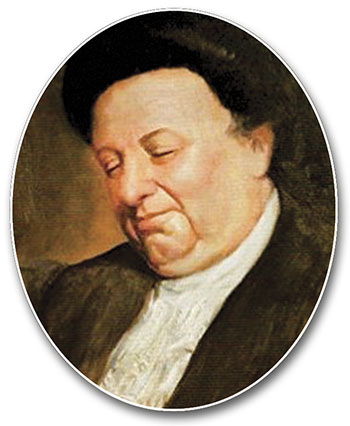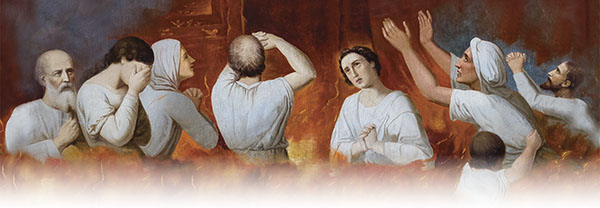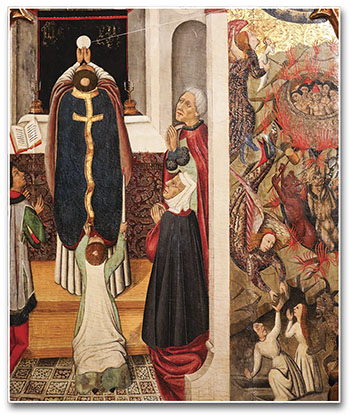Raised in an aristocratic cradle, a girl named Eugenie was born on May 15, 1867, in Munich, inheriting all the honours of the Germanic dynasty of Von der Leyen und zu Hohengeroldseck, and of the Thurn und Taxis lineage. Nobody, however, could have suspected that, allied to her high birth, remarkable gifts and charisms granted by the special disposition of Divine Providence would adorn her noble soul.1
Eugenie left us a diary, thanks to the happy recommendation of her spiritual director. These are pages that let us feel the love and mercy of the good God, as well as the great justice manifested in His sentences. Each of the annotations reveals interior dramas; not, however, of living people, but of souls in the afterlife, suffering the pains due to their sins…

Indeed, from the middle of 1921 until her last days, the princess received continuous visits from souls in Purgatory, who came to meet her in the most varied ways, begging for suffrage in the midst of so much pain. Screams, slamming doors, footsteps in the corridor, shadows and frights, sudden windstorms, weeping and moaning… in short, everything that for us would constitute a true horror story became part of Eugenie’s routine.
What is written remains
The symbolism of this kind of record is very profound. All our actions throughout our life make us the authors of a unique work, an authentic supernatural diary in which we leave an account, without falsehood or deceit, of our true moral physiognomy. These are blank pages given to man when he comes into the world and are taken up again, completed, when his eyes are closed forever.
After death, nothing more will be written. What is inscribed there will remain, and the Lord will read it and judge it. The beautiful and heroic works of holiness He will reward with glory; the pages stained by the heinousness of ingratitude and malice He will cast into the fire that never dies; but when He finds both virtue and vice written with the same pen, he will bar their authors from His presence until the stains disappear.
The Church teaches that “All who die in God’s grace and friendship, but still imperfectly purified, are indeed assured of their eternal salvation; but after death they undergo purification, so as to achieve the holiness necessary to enter the joy of Heaven. The Church gives the name Purgatory to this final purification of the elect, which is entirely different from the punishment of the damned.”2 During this painful period, it is natural for souls to seek compassion, turning to persons living on earth who can intercede for them. In fact, God is pleased with such mediation.
Leafing through the history of Israel’s heroes, we read that after the victorious assault on Gorgias’ army, Judas Maccabaeus and his companions returned to the field to collect the bodies of those who had fallen, in order to bury them. Under their tunics, however, they found amulets consecrated to the idols of Jamnia, indicating the supernatural reason why they had perished. Judas, in addition to exhorting the crowd about the seriousness of their sin, ordered a sacrifice to be offered for their dead brothers.
“In doing this he acted very well and honorably, taking account of the resurrection. For if he were not expecting that those who had fallen would rise again, it would have been superfluous and foolish to pray for the dead. But if he was looking to the splendid reward that is laid up for those who fall asleep in godliness, it was a holy and pious thought,” comments the sacred author (2 Mc 12:43-46).
The Divine Master himself teaches us that some faults are forgiven on this earth and others in the world to come, when He says: “And whoever says a word against the Son of man will be forgiven; but whoever speaks against the Holy Spirit will not be forgiven, either in this age or in the age to come” (Mt 12:32).
St. Paul, too, writing to the Corinthians, warns that fire will prove the worth of each person’s labour because, on the foundation that is Christ, each one builds with different materials, some with gold and silver, others with hay and straw: “If the work which any man has built on the foundation survives, he will receive a reward. If any man’s work is burned up, he will suffer loss, though he himself will be saved, but only as through fire” (1 Cor 3:14-15).
This is why, from the very beginning, the Church has remembered the faithful departed, recommending suffrage for them, especially in the Eucharistic Sacrifice, so that they may be freed from their faults. On certain occasions, by divine permission, the souls themselves turn to men in an extraordinary way to obtain relief from their sorrows. This is what happened to Eugenie von der Leyen: God invested her with a mission of mercy in order to suffer for souls in a very unique way.
A soul who attracted souls
Along with moving stories, the diary bequeathed to us by the princess reveals the dispositions of her virtuous soul. She was always assisted by her confessor – the parish priest Sebastian Wieser, to whom her writings were addressed – and invariably exhibited docile obedience to him. Among the accounts of the apparitions, we find lines dedicated to expressing the most diverse states of soul: desires for greater perfection, weaknesses and enormous fatigue, permeated with profound graces that made her experience the divine presence in her soul; they were dewdrops refreshing and consoling her in the midst of her suffering.
According to her confessor, Eugenie “led a holy life. She was truly devout, humble like St. Francis, zealous in doing good and unstintingly generous: always helpful and ready to renounce her own will, willing to make the greatest sacrifices, loved by God and by all those around her. Those who knew her revered her. She never wanted to attract anyone’s attention. She had a special talent for doing favours and giving others pleasant surprises. The princess’ character is the most solid guarantee that she deserves credence.”3
“Why do souls come to me?” This was the seer’s great question and, consequently, the query she always made to them. When they could answer her, they invariably said that her soul attracted them and that, by permission of the Good Lord, the way to her was open. There was no remedy but to accompany them in their sorrows, which were always so excruciating.

As is easy to understand, these visits exhausted her physical strength because, as well as being disproportionate to human nature, they took up many hours of her nights, which resulted in a real “slow-fire martyrdom”. “My relatives offer me a cordial ‘goodnight’, and I have to face the greatest torture,”4 Eugenie said.
On the advice of her confessor, she did not tell any of those closest to her what was happening. This silence made her suffer greatly, because she felt torn between two opposing worlds. No one could experience what she was experiencing. Only her nephew Wolfram sometimes saw the souls with her, as well as some household animals. “It is a pity that only little children, cats and chickens are witnesses to the apparitions,”5 sighed the princess.
How can souls suffer?
By God’s clear disposition and will, many souls presented themselves in the form of animals, signifying the sin they had committed. A large monkey, for example, caused her enormous suffering in the last months of 1925. Its disgusting appearance horrified her and was almost impossible for her to bear. Its hide, wet and dirty, had purulent sores which seethed with devouring worms. It was a symbol of the passions and sins of lust which that soul still needed to purge.
Another soul, whose name was Catarina appeared to her with a swollen mouth, misshapen and repulsive, so as to arouse real disgust. After a few weeks, she confessed: “I always created disunion.”6 This is the price to pay when the senses turn to the things of the world to perpetrate evil. The Church calls this purification the pain of sense, in which a real but mysterious fire chastises the spirit for having subjected itself to the misdeeds of the flesh.
On another occasion, when Eugenie asked a soul what her sufferings consisted of, the latter approached and, before the princess could prevent it, touched her hand, causing her to cry out in pain and leaving a red burn mark.
Nevertheless, this is not the greatest suffering of a soul in Purgatory. There is something incomparably more painful: being prevented from contemplating the Creator, and this profoundly purifies them, them, establishing in them a loving relationship with Him. While the pain of sense chastises the soul for having turned to creatures, the pain of loss chastises man for having turned away from the Lord. Divine contempt, the feeling of abandonment and the vehement desire to see the face of God consume souls in indescribable and inconceivable pain. “The devouring longing to see Him [the Divine Majesty] is our torture,”7 another soul tearfully confessed to her.
Learning from souls
Naturally, having been invested by Providence with this arduous mission, Eugenie was greatly benefited by the souls, not only when they went to Heaven, but also during the apparitions. She sometimes received harsh rebukes from souls who were unhappy with her lack of generosity. “I am grateful when the souls in Purgatory help me to change for the better”; “Thank God that they are now in charge of my education!”8 she confided. The seer herself would often ask them what they saw in her that could be improved. The souls were always very demanding, having already known Perfection…
Consoling the souls in Purgatory
What they invariably asked of her was mortification of the will and the senses, as well as forgetting herself and being generous. She tried to unite herself to Christ, completing in her flesh what was lacking in the Redeemer’s sufferings (cf. Col 1:24): She would even flagellate herself when asked to do so, and would stay up all night in a true martyrdom.

The Eucharistic Banquet was undoubtedly the greatest source of consolation for souls, especially for those who during their lives showed sincere and deep devotion to the Holy Mass. “The stream of the Sacrifice flows without stopping. It is the salvation of those who have believed in it,”9 explained one of them. However, those whose devotion to the Eucharist was minimal did not benefit as much: “Not everyone receives the fruits; God is just.”10
Holy water was also both consolation for souls and protection for Eugenie. Consolation because it relieved their suffering, and protection when it satisfied the demands of some who threatened to attack her. Curiously, despite the fact that these were spirits, the princess did not see a drop of holy water on the floor after sprinkling her visitors.
Our diaries
December 17, 1928 brings to a close the diary of Eugenie von der Leyen, who gave her soul to God on January 9 of the following year.
So let us close that diary and open our own, for the mystery surrounding the afterlife will continue to challenge our consciences about the disposition of our souls in the face of an uncertain future. No matter how extraordinary the advances in technology, science and medicine, which set out to quench contemporary man’s thirst for omnipotence, there will always be deep-seated uncertainty in his mind about the moment of death and what follows it.
When that moment comes – which it will for all – what will I have done with the talents that the Lord has entrusted to me?
Nothing is hidden from His eyes: all our thoughts, words, deeds and omissions are recorded. We must examine our actions and recover the friendship of the Creator while we are on our way to the homeland (cf. Mt 5:25), because in the divine tribunal, the Judge is the offended party and there is no second hearing.
However, may our desire for perfection not be driven by fear alone. Love will lead us higher than fear, as can be seen from the words of Pope Benedict XVI:
“The judgement of God is hope, both because it is justice and because it is grace. If it were merely grace, making all earthly things cease to matter, God would still owe us an answer to the question about justice – the crucial question that we ask of history and of God. If it were merely justice, in the end it could bring only fear to us all. The Incarnation of God in Christ has so closely linked the two together – judgement and grace – that justice is firmly established: we all work out our salvation “with fear and trembling” (Phil 2:12). Nevertheless grace allows us all to hope, and to go trustfully to meet the Judge whom we know as our “advocate” (cf. 1 Jn 2:1).11 ◊
Notes
1 The princely title of Von der Leyen was conferred on them because their descendants had been sovereign members of the Rhine Alliance since July 12, 1806 (cf. GUILLET, Arnold. Apresentação. In: VON DER LEYEN, Eugênia. Conversando com as almas do Purgatório. 2.ed. São Paulo: Ave-Maria, 1996, p.10).
2 CCC 1030-1031.
3 GEHRING, Peter. Prefácio. In: VON DER LEYEN, op. cit, p.41.
4 VON DER LEYEN, op. cit, p.165.
5 Idem, p.137.
6 Idem, p.81.
7 Idem, p.173.
8 Idem, p.93; 110.
9 Idem, p.142.
10 Idem, p.179.
11 BENEDICT XVI. Spe salvi, n.47.


